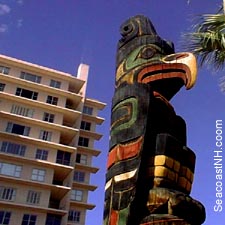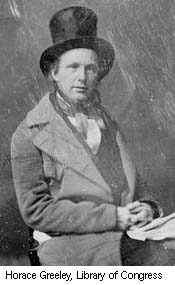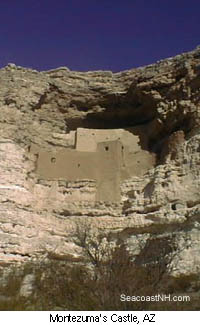|
FRESH STUFF DAILY |
|
|
||
|
|
||
|
|
||
|
SEE ALL SIGNED BOOKS by J. Dennis Robinson click here |
||
Page 1 of 2
Who would purposefully live near a scorching desert with rattlers and scorpions under every cactus? Funny thing is, the independent, hard-knuckle entrepreneurial citizens of Phoenix sure many of the characters of a life-long New Englander. And with Global Warming, even the temperature is similar.
JUMP BACK to Part One The Yankee version of American history goes like this: (a) the Pilgrims founded this nation when they landed here in New England; (b) the 13 original colonies, including all six New England states, formed here in the East; (c) our Boston Tea Party and the Shot Heard Round the World kicked off the American Revolution; (d) the North won the Civil War; (e) a guy from New Hampshire named Horace Greeley said "Go West, young man," people did, and the American Frontier was settled.
Newspaperman Horace Greeley, born in Amherst, NH, had never actually been West in 1841 when he urged young Americans to abandon squalid Eastern cities and factories, and head for the Frontier. When Greeley finally took his own advice and got a look at the great American desert in 1859, he wrote, "This desolation seems irredeemable." Make up your mind, Horace! By the time I took Greeley's advice to go West, I was no longer a young man. My brain had been pickled in the brine of Yankee chauvinism for half a century. My first instinct, upon arriving in Phoenix, Arizona, was to hike alone into the Senoran desert and commune with an ancient saguaro cactus. The next day I visited what Westerners call "historic houses" preserved from way back in the 1920s. Heck, my last office building was a century older than that. The Phoenix Historical Society has a covered wagon out front, but the architecture is distinctly space age. To break down my cowboy TV-stereotype of the Wild West, I visited a dude ranch near Mesa, where a bunch of good ol' boys dressed up like cowboys and re-enacted the founding of Arizona by shooting the hell out of each other with Colt 45s loaded with blank cartridges. Then we all 'et some biscuits and beans out of a chuck wagon and listened to a bluegrass band.
"We don't hold much stock in that East-to-West theory of American history around here," he said over the PA system while easing the van onto the Arizona State highway. Forests of ancient saguaros, arms uplifted, whirled by. Phoenix might look modern, the guide explained, but it was built atop abandoned Hohokam Indian irrigation ditches that date to the late 1400s. The Native American presence, methodically eliminated from New Hampshire by whites in the 1700s, remains strong in Arizona. Reservations comprise a third of the state's territory where a range of tribes and languages thrive. Trading posts, petroglyph markings, Indian folk and fine art, even gambling casinos abound here. Phoenix didn't even become a state until 1912. Still it's hard to argue the seniority of New England while standing below the five-story high cliff dwellings of the Sinagua Indians at Camp Verde, our first stop on the tour. Archeologists estimate Native Americans lived in the American Southwest at least 25,000 years ago. That may be true of New England, too, but the current proven date is about 10,000 years. If only European exploration starts your clock, Arizona history still beats the Mayflower crowd by nearly a century with the arrival of Spanish explorers in the early 1500s. They were searching for easy gold, as were our pre-Pilgrim explorers in the East. Instead they found natural resources - and a lot of back breaking work. Yankee in the Desert, Part 1
Please visit these SeacoastNH.com ad partners.
News about Portsmouth from Fosters.com |
| Friday, April 26, 2024 |


|
Copyright ® 1996-2020 SeacoastNH.com. All rights reserved. Privacy Statement
Site maintained by ad-cetera graphics

 HISTORY
HISTORY




 That view may be distorted, even downright false, but it's what I learned in school. Those Plymouth Pilgrims, the original New Englanders, were headed West too, but arriving by sailing ship instead of prairie schooner -- and arriving first -- got them into Chapter One of the US history textbook, and first place in this culture, means everything. Whatever we studied about the West must have been crammed in at the end of the school year. I recall only a guacamole of proper nouns - Alamo, Lewis & Clark, Donner Pass, Gold Rush, Mexican War, Mormons, Geronimo, Missouri Compromise, Tombstone, Fort Apache.
That view may be distorted, even downright false, but it's what I learned in school. Those Plymouth Pilgrims, the original New Englanders, were headed West too, but arriving by sailing ship instead of prairie schooner -- and arriving first -- got them into Chapter One of the US history textbook, and first place in this culture, means everything. Whatever we studied about the West must have been crammed in at the end of the school year. I recall only a guacamole of proper nouns - Alamo, Lewis & Clark, Donner Pass, Gold Rush, Mexican War, Mormons, Geronimo, Missouri Compromise, Tombstone, Fort Apache. The third day, craving company and guidance, I joined a dozen fellow tourists in a glass-walled maxi-van. I skipped over the quickie shopping spree across the Mexican border and the mad dash one-day tour to the Grand Canyon and settled, instead, for a day trip to scenic red-rock Sedona. Our group leader Rick Kingsbury, a third-generation Arizonan, got right to the point:
The third day, craving company and guidance, I joined a dozen fellow tourists in a glass-walled maxi-van. I skipped over the quickie shopping spree across the Mexican border and the mad dash one-day tour to the Grand Canyon and settled, instead, for a day trip to scenic red-rock Sedona. Our group leader Rick Kingsbury, a third-generation Arizonan, got right to the point:














